Toby Melville/Reuters
By
Estelle Shirbon and Ben Blanchard
Britain plunged deeper into political crisis on Sunday after its vote to leave the European Union last Thursday, leaving world officials and financial markets confused about how to handle the political and economic fallout.
Britain’s Prime Minister David Cameron is expected to stay on in a caretaker role until the UK Conservative Party elects a new leader in about three months, after he resigned on Friday.
But he has refused to invoke Article 50 of the EU’s Lisbon Treaty, which allows for two years of exit negotiations, leaving little clarity about how or when Britain will begin negotiations with the EU on a new relationship.
In the referendum, voters ignored Cameron’s appeals to stay in the EU by 52 percent to 48 percent, delivering the biggest blow since World War Two to the European project of forging greater unity.
Cameron is expected to meet the other 27 EU leaders at a summit in Brussels on Tuesday.
British Finance Minister George Osborne, who had warned during the campaign that a “Brexit” would cause financial market volatility, scheduled a statement for 7 a.m. London time(0600 GMT) on Monday to provide reassurance about “financial and economic stability”.
Boris Johnson, the leading “Leave” campaigner, former London mayor and favourite to become the next Conservative Prime Minister, sought to calm fears about Britain’s economic future, saying it would continue to have access to the EU single market.
But Johnson did not explain how he planned to secure free trade with Europe without sacrificing some of the main promises that “Leave” campaigners made to voters, notably that Britain would be able to cut immigration and free itself from regulations set in Brussels. .
Cameron’s Conservatives have been at war with each other for years over whether to quit the EU. But the vote to leave a bloc that Britain joined 43 years ago also pushed the UK Labour party into chaos over the weekend.
Senior Labour Party parliamentarians withdrew backing for their leader after traditional supporters rejected the party’s pro-EU stand in droves.
Britain’s opposition Labour Party leader Jeremy Corbyn leaves his home in London, Britain June 26, 2016. REUTERS/Peter Nicholls
Scotland’s leader promised she would do whatever it takes to keep her strongly pro-EU country in the bloc, including potentially vetoing legislation on a British exit.
French President Francois Hollande declared there was no going back on “Brexit”, saying: “What was once unthinkable has become irreversible”.
Hollande said France and Germany must use their strong friendship to seize the initiative, warning that “separated, we run the risk of divisions, dissension and quarrels”.
He and Chancellor Angela Merkel discussed the issue by phone and an aide said they were in “full agreement on how to handle the situation”.
The EU is preparing to move its European Banking Authority from London following Britain’s vote to leave the Union, EU officials said on Sunday, setting up a race led by Paris and Frankfurt to host the regulator.
The move underlines how the City of London can expect to be frozen out of EU financial regulation, and possibly from Europe’s capital markets, depending on the terms of Brexit.
While those who argued for Britain to leave the EU said the financial industry would thrive without EU shackles, some of its biggest employers, including JPMorgan, are scouring Europe to find new locations for their traders, bankers and financial licenses.
The United States, which had made clear it wanted Britain to stay in the EU, also showed signs of unease. U.S. Secretary of State John Kerry will visit Brussels and London on Monday. A senior official said Kerry would stress the importance of other EU members not following Britain to further weaken the bloc.
World Leaders Warn, Markets Fragile
Speaking in Aspen, Colorado, on Sunday, the International Monetary Fund managing director, Christine Lagarde, acknowledged that financial markets “vastly underestimated” the outcome of the Brexit vote, but said “central bankers did the job they were prepared to do just in case, which was to put a lot of liquidity on the markets”.
Lagarde said that how markets react going forward depends on what steps UK and European policymakers take to deal with the separation vote and limit uncertainty.
“At this point in time, policymakers both in the UK and in Europe are holding that level of uncertainty in their hands. How they come out in the next few days is going to really drive the direction in which risk will go,” Lagarde said.
Japan will ensure liquidity in the yen and in foreign currencies if needed by tapping currency swap lines established among six central banks, Bank of Japan Deputy Governor Hiroshi Nakaso said on Monday.
Central bankers gather in Portugal on Monday for a previously scheduled conference hosted by the European Central Bank and a speech by ECB President Mario Draghi is expected around 1530 GMT. The Federal Reserve chair, Janet Yellen, Bank of England Governor Mark Carney and China’s central bank Governor Zhou Xiaochuan are expected to attend.
The British pound fell as much as 10 percent against the U.S. dollar on Friday to levels last seen in 1985, while more than $2 trillion was wiped off the value of world stocks, the biggest daily loss in history, according to Standard & Poor’s Dow Jones Indices.
As world financial markets reopened for the week, the British pound fell another 2.0 percent in early trade on Monday and U.S. S&P 500 stock index futures, the world’s most traded stock futures, fell 0.7 percent.
The euro also came under further pressure, falling 0.8 percent against the U.S. dollar, as investors fret Brexit could stoke the anti-establishment mood in Europe.
“(There will be) sell-off in the euro as talk of other exit referenda builds,” said Jerome Booth, chairman of New Sparta Asset Management in London.
“This sell-off will be more profound and long-lasting and will be not just against the dollar and yen but also against the pound. It will also raise fears of significant loss of values for holders of Euro-zone government bonds”.
Passersby reach out to receive an extra edition of newspapers, which the headline reads “Britain, EU Leave”, on the street in Tokyo, Japan, June 24, 2016. REUTERS/Issei Kato
Economic Slowdown?
Among the many questions the Brexit vote has triggered are just how much UK and European economies will slow down, how they will negotiate their new trade relationship.
The United Kingdom is likely to enter recession within the year as a result of last week’s vote, a decision that will also stunt global economic growth, Goldman Sachs’ top economists said on Sunday.
“We now expect the (UK) economy to enter a mild recession by early 2017,” Goldman economists Jan Hatzius and Sven Jari Stehn wrote in a note for clients.
They expect the political, economic and regulatory uncertainty following the vote to chop a cumulative 2.75 percent off UK gross domestic product in the next 18 months.
Goldman now expects eurozone GDP over the next two years to average 1.25 percent versus 1.5 percent before the Brexit vote.
For the U.S. economy, the bank now expects GDP growth in the second half of 2016 to come in at 2.0 percent versus a forecast of 2.25 percent previously.
Germany and France
The foreign ministers of Germany and France have drawn up a nine-page document entitled “A strong Europe in a world of uncertainties” in which they propose common European security and migration policies and strengthened economic convergence.
Acknowledging that the European Union is “being severely put to the test”, Frank-Walter Steinmeier and Jean-Marc Ayrault said the bloc was challenged by a series of crises to its south and east while economic growth was on a slow recovery path. Work on the paper began before Britain voted on Thursday to quit the EU.
“Neither a simple call for more Europe nor a phase of mere reflection can be an adequate answer,” Frank-Walter Steinmeier and Jean-Marc Ayrault said in the paper, a copy of which was seen by Reuters.
“To prevent the silent creeping erosion of our European project we have to be more focused on essentials and on meeting the concrete expectations of our citizens,” they added.
The two ministers, whose countries are at the core of the EU, said it was important to recognise that member states had different appetites for deepening European integration.
“We have to find better ways of dealing with different levels of ambition so as to ensure that Europe delivers better on the expectations of all European citizens,” they said.
To this end they proposed three initiatives:
1. A European Security Compact, under which:
– The EU should establish agreed strategic EU priorities for foreign and security policy and promote an integrated EU policy in these areas.
– Those EU member states willing to establish permanent structured cooperation in the field of defence should be able to do so in a flexible manner.
– If needed, EU member states should consider establishing standing maritime forces or acquiring EU-owned capabilities in other key areas.
2. A common European asylum and migration policy. The ministers said:
– We are determined that the EU should establish the world’s first multinational border and coast guard.
– The EU must find a common answer to the rising number of migrants seeking to enter the EU for economic reasons.
– We will work to reduce push factors for irregular migration.
3. Fostering growth and completing the Economic and Monetary Union (EMU). The ministers said:
– To unlock growth and to increase the productivity of the European economy, a renewed effort for more investment, both private and public, is necessary.
– A deepening of EMU will not come as a big bang but as the result of a pragmatic and gradual evolution.
– An EMU fiscal capacity should start by 2018 at the latest to support investment in the member states most severely hit by the crisis.
German Chancellor Angela Merkel gives a statement in Berlin, Germany, June 24, 2016, after Britain voted to leave the European Union in the EU BREXIT referendum. REUTERS/Hannibal Hanschke
Germany and France agree on one thing: that Europe must change following the shock of last week’s Brexit referendum.
But after years of economic and political crisis in Europe that have left deep scars in Berlin and Paris, there appears to be little agreement between the bloc’s top two powers about what kind of change is needed and how fast it should come.
That suggests that the Franco-German engine that has powered the EU for decades may struggle to deliver the change many European officials feel is necessary to win back the support of citizens, fight off a right-wing populist surge and avert a gradual disintegration of the bloc.
Over the weekend, as Europe began digesting the prospect of an EU without Britain, a cacophony of conflicting signals were being sent out by politicians on either side of the Rhine, despite a joint paper by the German and French foreign ministers meant to minimise the differences and highlight common ground.
The most obvious and immediate divide is over how to treat Britain in the immediate aftermath of the vote.
At a meeting of Chancellor Angela Merkel’s conservatives south of Berlin, she and her aides made clear that they were ready to give Britain the time it needs to sort through its political mess before starting talks on the terms of a Brexit.
Some officials in Berlin may even be hoping that the referendum could be reversed. Regardless, their priority is to prevent an acrimonious rupture with London.
“Of course the EU has the means to pressure Britain but we shouldn’t focus on that,” one senior German official told Reuters. “They need the time to realise what they’ve done. There is no need for threats or pressure at the moment.”
French politicians from across the political spectrum are sending a different message. They have made clear in recent days that a quick divorce is necessary. Some are describing Brexit as an opportunity for France to reassert its leadership in the EU.
“There can be no cat and mouse game,” French Foreign Minister Jean-Marc Ayrault said.
French Prime Minister Manuel Valls, French President Francois Hollande and Italy’s Prime Minister Matteo Renzi sit at a table in the garden at the Elysee Palace in Paris, France, June 25, 2016. REUTERS/Christophe Saidi
Diverging Priorities
Beyond the question of how quickly Brexit talks should start, Germany and France remain deeply divided over how to reform Europe, beyond the notion that something must be done to remind sceptical populations of Europe’s purpose.
Merkel will meet with Hollande in Paris on Monday, along with European Council President Donald Tusk and Italian Prime Minister Matteo Renzi, to try to forge a common message before an EU summit on Tuesday and Wednesday.
The ever-cautious Merkel told members of her conservative party at the weekend that she saw no need for a radical reinvention of the European Union in the wake of the Brexit vote. Instead, she said, Europe should take time to reflect and work patiently to address its flaws.
For the Germans, there are two main priorities for Europe: agreeing a fair mechanism for distributing refugees across the bloc and pressing ahead with structural reforms in economically weak countries to improve long-term growth prospects.
The French are in a different place. Unlike Merkel, who seems on track to win a fourth term next year, President Francois Hollande is politically weak and, if he runs at all, seems unlikely to make it into the second round of the French election next spring.
His government faces a major challenge from the far-right National Front. It is battling protests against its labour market reforms. And the country remains in a state of emergency following attacks by Islamic militants last November which killed 130 people in Paris.
“The Franco-German couple no longer exists as far as I’m concerned, not because of who is in power, but because we no longer have any credibility with the Germans,” said former French Prime Minister Francois Fillon on Sunday.
“It will be very difficult for Francois Hollande to launch a new European initiative. You need credibility to do that.”
That hasn’t prevented Hollande and his Prime Minister Manuel Valls from talking about the need to move fast to “reinvent” Europe.
Their vision however, elements of which can be found in the joint paper from Ayrault and German Foreign Minister Frank-Walter Steinmeier, is one that prioritises security on the one hand and a more “social” Europe on the other.
This vision is shared by Germany’s Social Democrats (SPD). SPD leader Sigmar Gabriel and his party colleague Martin Schulz, the president of the European parliament, issued a separate paper at the weekend which called for a major shift in economic priorities in Europe, away from fiscal discipline towards more pro-growth policies.
But Merkel’s conservative allies are having none of it.
“The Socialists want German taxpayers to subsidise countries that aren’t reforming,” one senior ally told Reuters. “This would be a catastrophe.”
France
The European Union must stop being nit-picky and intrusive, French Prime Minister Manuel Valls said on Sunday as the bloc scrambled to handle the aftermath of Britain’s vote to leave.
The Brexit vote to leave the EU has deepened fears among mainstream politicians across Europe about the rise of eurosceptic, anti-establishment parties, particularly in France, where the far-right National Front is increasingly popular.
That concern has also prompted mainstream French politicians on the left and right to call for an overhaul of Europe, in a country where surveys show disillusionment with Brussels is growing.
“We must put an end to this sad and finicky Europe. Too often it is intrusive on details and desperately absent on what’s essential,” Valls said. “We must break away from the dogma of ever more Europe. Europe must act not by principle but when it is useful and pertinent.”
Former President Nicolas Sarkozy echoed those sentiments. “Europe cannot continue to build itself against the people,” he said.
While a large majority of French are attached to EU membership, polls over the past few years have consistently shown a majority also want Europe to have fewer powers, said Francois Miquet-Marty, head of the Viavoice polling institute.
Only one on five voters want “more Europe”, he said.
Long in the EU’s driving seat alongside the bloc’s power-house Germany, France, dogged by a poor track-record on abiding by the EU’s fiscal rules, has been steadily less active on the EU scene over the past years.
In his speech on Sunday in Normandy, Valls insisted Europe “is not about seeing sovereign states disappear.”
He also said Europe must defend its economic interests better, on trade matters but also on financial, social, environmental and cultural issues. “Europe must be firm,” he said.
While an Odoxa opinion poll on Friday showed 64 percent of French want to stay in the EU, the number of those who want to leave rose by 7 percentage points in the course of three months.
Sarkozy said he wasn’t sure what the answer would be if the French were asked a Leave or Remain question in a referendum.
“Do you think that 30 kilometres of Channel between us mean we’d think that differently?” he told France 2 television.
However Sarkozy, who had so far rejected the idea of an EU referendum in France, added his voice to a growing chorus of politicians of all political stripes saying a referendum on a new treaty or EU project could be a good idea.
Only the far-right National Front wants a referendum on EU membership.
“We should not be afraid of the people,” Sarkozy said. If there was a new treaty setting out clear choices for Europe “I don’t see how we could refuse (a referendum),” he said.
Italian Foreign Minister Paolo Gentiloni, Belgium’s Minister of Foreign Affairs Didier Reynders, German Foreign Minister Frank-Walter Steinmeier, French Foreign Minister Jean-Marc Ayrault, Dutch Foreign Minister Bert Koenders and Luxembourg’s Foreign Minister Jean Asselborn (L-R) pose for a group picture before a foreign minister meeting of the EU founding members in Berlin, Germany, June 25, 2016. REUTERS/Axel Schmidt
Brussels
Negotiators from 27 European Union states met in Brussels on Sunday to discuss Brexit at the first such meeting after Britons voted to leave the bloc, and a senior official said London’s envoy was not invited.
Britons voted by 52 to 48 percent to leave the European Union, an unprecedented blow to Europe’s post-war order, leaving politicians in EU capitals and Brussels pondering how to handle what they expect to be a long and painful divorce.
The 27 EU affairs negotiators – or ‘sherpas’ – held talks to prepare a meeting of their countries’ leaders on Wednesday when they will have their first chance to discuss the Brexit vote.
It will be held without the British leader for the first time – a practice likely to become the new normal in Brussels.
“The UK sherpa… was not invited but he understands,” the senior EU official said of Tom Scholar, the top adviser on European and global issues to the outgoing Prime Minister David Cameron.
“I think also Prime Minister Cameron understands that if the UK is in the logic of ‘Leave’, then the EU 27 needs to be in the logic of ‘We have to prepare ourselves for that step’.
A British flag flutters in the air next to the flags of other European countries at Parque Europa (Europe Park) in Torrejon de Ardoz, outside Madrid, Spain, June 25, 2016. REUTERS/Susana Vera
Scenarios
Stalemate between Britain and the European Union over what happens next following Britons’ referendum vote to leave has opened up a host of possible scenarios.
Here are some that are (in some cases, barely) conceivable:
1. BY THE BOOK
Prime Minister David Cameron, who said he will resign after losing his gamble to end British ambivalence about staying in, agrees with the EU establishment that the only legal way to leave is to use Article 50 of the EU’s Lisbon Treaty to negotiate a withdrawal.
He wants to leave triggering the process to his successor, who may not be chosen by the Conservative party until October. EU leaders want him to do it now, or at least as soon as possible, but they lack the legal power to force him.
In the most amicable divorce scenario, Britain would trigger Article 50, possibly (though unlikely now) as early as Tuesday when Cameron meets the other 27 EU leaders at a Brussels summit, or via a formal letter later from Cameron or his successor.
That sets a two-year time limit on negotiating an amicable withdrawal. Ideally, it would divide up assets and liabilities in the shared EU budget and other priority business, such as perhaps the status of British and other EU citizens who find themselves living on the wrong side of a hard new UK-EU border.
In an even more ideal world, it would set out a new, close economic relationship between Britain and the EU, possibly in a separate, parallel treaty taking effect from the exit date. The withdrawal treaty can be enacted by just 20 of the 27 other states representing 65 percent of the remaining population. A full new relationship would probably need unanimous support.
Two years is very tight but the negotiations can be extended if all 28 countries agree. If there is no deal, then Britain is simply out of the EU two years after Article 50 was triggered — an outcome written in to the treaty to limit uncertainties.
REALLY? TOO GOOD TO BE TRUE. THE EU IS NEVER THIS EASY
2. SORRY, WE DIDN’T MEAN IT
Britain is in political meltdown, with both main parties in civil war and pro-EU Scotland threatening to either block Brexit legally (unclear how) or break away. The referendum result is not constitutionally binding and government and parliament, maybe after a new election, could just ignore it. If so, the EU would carry on as before but a special membership deal it gave Cameron in February has been killed by the referendum result.
REALLY? PUSHES DEMOCRATIC CREDIBILITY BEYOND BREAKING POINT
3. WE MEAN IT, BUT NOT YET
Brexit campaigners have long been suspicious of the two-year limit in Article 50 and some have explicitly said it should only formally be triggered AFTER they have agreed a comprehensive free trade deal that relieves Britain of EU rules such as open EU immigration. Five years or more is the norm globally for such big trade deals. Britain would be a full EU member until then.
That is a nightmare scenario for EU leaders, plunging the bloc into open-ended negotiations with its second biggest power that would inspire eurosceptics across the bloc to emulate it and distract governments from other pressing European issues.
They rule out opening any negotiation until Britain binds itself to the timetable set out in Article 50. And they insist Britain cannot have its cake on market access and still eat it by ending EU budget payments and free movement of workers.
In theory, there could be an endless standoff, with Britain the sulky teenager at the table, poisoning the atmosphere next year as France and Germany run elections and the EU starts confrontational talks on a new 7-year budget. Something would have to give and some compromise would start to be worked out.
REALLY? COMPROMISE IS THE EU WAY; DON’T RULE THIS OUT
4. WE MEAN IT — OR MAYBE WE DIDN’T
Article 50 suggests a one-way exit, rather than a revolving door. EU officials insist that once triggered, a state cannot back out and stay. It is not entirely clear, however. Could a future British government conclude that the best settlement to divorce proceedings is just to stay married, if others agree?
REALLY? SEE SCENARIO 2, BUT WITH ADDED FADING OF MEMORIES
5. CAN WE JUST TWEAK THIS QUICKLY?
Some Brexit campaigners have suggested that the Leave vote simply serve as leverage to renegotiate better, semi-detached terms for Britain inside the EU which could be put to another referendum. EU leaders have ruled that out on the same grounds as above that “cherry picking” will spread and wreck the Union. Cameron’s deal, to protect the City of London from the euro zone and curb EU immigration, has been killed by a clause that linked it to last week’s referendum result. So any talks would start from a lower base and EU leaders would have to eat their words. But some kind of “associate membership” or “special partnership” has been around as an idea in Europe for a time.
REALLY? SEE 4, BUT NEVER SAY NEVER IN EURO-COMPROMISE LAND
6. LET’S JUST SLIP INTO SOMETHING MORE COMFORTABLE
Britain could try to join the European Economic Area or European Free Trade Association, joining the likes of Norway, Switzerland or Iceland in close partnerships with the EU. That could fly with the EU but British leaders would have to persuade Brexit voters to agree to the EU budget contributions and migrants that are accepted by some of those countries. It also would lack the kind of EU market access for services trade which is so important to Britain’s big financial sector. A more tailor-made deal would bring things back to earlier scenarios.
REALLY? DOESN’T SEEM TO BE WHAT BRITONS WANT, AT LEAST NOW
7. WHY DON’T WE START AGAIN?
One extreme view is that the fallout from Brexit in the EU might be so cataclysmic that Europeans would go back to the drawing board and effectively create a new kind of Union that could include Britain. Marshalling disparate national ambitions into a new structure would be a colossal task, not least in the wake of the bitterness that the current crisis has engendered.
REALLY? A DEFINITE LONG SHOT, NOT ONE FOR THE NEAR FUTURE
8. SECOND TIME LUCKY?
Some people who voted to Leave have said that if it doesn’t work outside, Britain could always join the EU again. That is true, though it would get no favours. It would face a years-long accession process and require unanimous acceptance by existing members and have to accept a host of conditions that Britain has opted out of during its past 43 years — notably adopting the euro and a virtually 50-percent rebate on EU membership fees.
REALLY? ONE FOR THE (VERY LONG-LIVED) BIRDS
9. ROOM FOR A LITTLE ONE?
Some Scots hope to avoid Brexit by breaking from England. An idea that an independent Scotland could somehow simply sit in the vacant UK chair in Brussels is dismissed by EU officials.
At the time of the 2014 independence referendum, the EU said Scotland could apply for membership but would go to the “back of the queue”, behind the likes of Serbia, and that its hope of keeping the pound rather than the euro was a non-starter. There is some sympathy for Scots losing their place in the EU but also deep suspicion of secession, especially in Spain, Belgium and Italy, which have their own separatist problems. And a veto.
REALLY? NOT SOON, BUT SCOTLAND COULD JOIN THE EU ONE DAY
10. SLAMMING THE DOOR
A new British government simply walks out. It could launch Article 50 and leave legally in 2019 without any negotiation. It could also ignore the two-year notice period and tear up its treaty obligations and quit right away, though that would undermine its credibility as a party to international law. There is, however, nothing the EU can do to prevent that.
It could retaliate on trade or against Britons living in the EU, however much that would create a painful tit-for-tat that would badly hurt Europe’s economy and citizens. Nonetheless, EU leaders fear that letting Brexit Britain walk all over them will only inspire other European nationalists to destroy the Union.
Additional reporting by Andreas Rinke, Paul Carrel, Ingrid Melander, Noah Barkin, Gabriela Baczynska and Alastair Macdonald

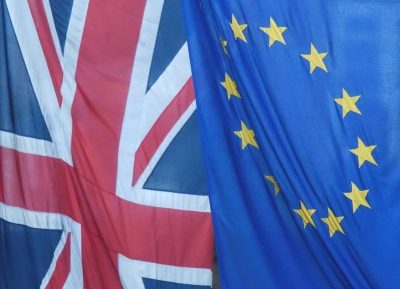
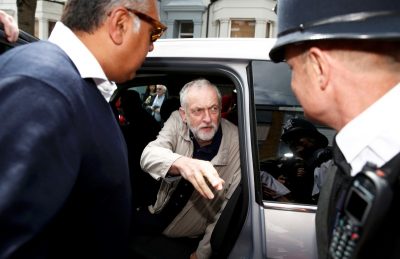

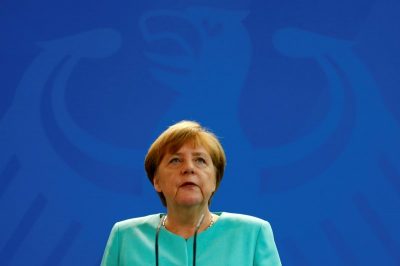

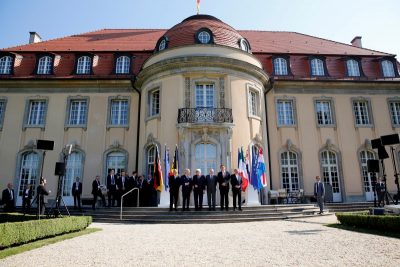
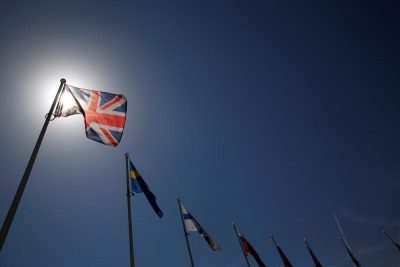

No Comments Yet!
You can be first to comment this post!